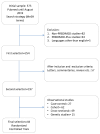Experimental Outcomes of the Mediterranean Diet: Lessons Learned from the Predimed Randomized Controlled Trial
- PMID: 31817731
- PMCID: PMC6949939
- DOI: 10.3390/nu11122991
Experimental Outcomes of the Mediterranean Diet: Lessons Learned from the Predimed Randomized Controlled Trial
Abstract
The Mediterranean Diet (MD) is, culturally and historically, the nutritional pattern shared by people living in the olive-tree growing areas of the Mediterranean basin. It is of great importance for its potential preventive effect against cardiovascular diseases (CVDs). The PREvención con DIeta MEDiterránea (PREDIMED) study, a Spanish multicentre randomised controlled trial (RCT), was designed to assess the long-term effects of the MD, without any energy restriction, on the incidence of CVD in individuals at high cardiovascular (CV) risk. Since its inception, it gave a great contribution to the available literature on the issue. It is well known that, in the field of the health sciences, RCTs provide the best scientific evidence. Thus, the aim of the present review is to analyse the results of the RCTs performed within the frame of the PREDIMED study. Our findings showed that MD has beneficial effects in the primary prevention of CVDs, diabetes and in the management of metabolic syndrome.
Keywords: Mediterranean diet; PREDIMED; cardiovascular disease; dietary intervention; metabolic syndrome; randomized controlled trials; type-2 diabetes mellitus.
Conflict of interest statement
Lluís Serra-Majem is the Editor in Chief of Nutrients. The other authors have no conflict of interest to declare.
Figures


References
-
- Trichopoulou A., Martínez-González M.A., Tong T.Y., Forouhi N.G., Khandelwal S., Prabhakaran D., Mozaffarian D., de Lorgeril M. Definitions and potential health benefits of the Mediterranean diet: Views from experts around the world. BMC Med. 2014;12:112. doi: 10.1186/1741-7015-12-112. - DOI - PMC - PubMed
Publication types
MeSH terms
Substances
LinkOut - more resources
Full Text Sources

